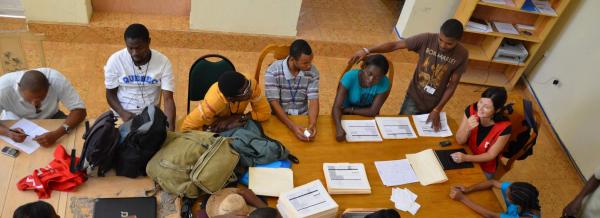The Highs
• Meeting people from different walks of life
Currently I live and work at a camp where international volunteers arrive weekly to help teach the children and care for the animals. The volunteers range in both age and background, and on average there are around 20 of us living at the camp each week. Although this means life is busy, it is great to learn from and speak to people I might never have come across in "normal" life.
• Learning about other peoples’ cultures
Living in the DAKTARI community has helped me further understand the importance and value of taking the time to learn about other peoples’ cultures. All the staff that work at the camp are locally based South Africans. The volunteers are from different countries around the world, each bringing their own culture and traditions with them. In a practical sense, this means every person has their own way of doing things and what it means to be polite for one person may be very different to another.
When you live in a small community with limited resources, you have to think about how your actions are going to impact the rest of the group and not always put your own interests first.
• Changing your perspective
When you live in a small community with limited resources, you often have to think about how your actions are going to impact the rest of the group and not always put your own interests first. For example, if there are only a few bananas left, I know to leave them for the animals, as the next delivery won’t be arriving for a few days. The animals also make up a significant part of the camp community and also need to be considered when making decisions that affect the camp.
• An inclusive atmosphere
No matter your race, religion, gender, nationality, culture and age everyone is included and equally involved in the organization, as we are all working towards the same common goal—keeping it running as successfully as possible.
The Lows
• The lack of privacy
The nature of the organization requires that we all eat together, three times a day. This means I share my living area, kitchen, dining area and pretty much everything else with at least 20 adults, eight children, and who knows how many animals! Most of the time, living like this is a lot of fun but sometimes the lack of privacy can be challenging.
• No separation between your personal life and your work life
Although I love the fact that my office is only a few minutes away from my room, living at work comes with its challenges. It is difficult to determine when work "ends." Because you live with your colleagues, you often find yourself thinking and talking about work, making it hard to switch off.
• Little control over your schedule
As the basis of the project is a bush school, it is important for the day to be scheduled so the children can complete all of their lessons. Given we eat with the children and the volunteers this means that my day is regulated by a strict schedule. Breakfast is at 7:30am, work starts at 8:00am, lunch is at 12:30pm, work then finishes at 5:00pm, dinner is at 6:30pm and then it is time for bed. Having little flexibility with my days (especially at mealtimes) can be challenging at times.
Although there are both ups and downs to living in a small community, overall it is extremely rewarding and learning to overcome the challenges is part of the experience.
Add this article to your reading list




